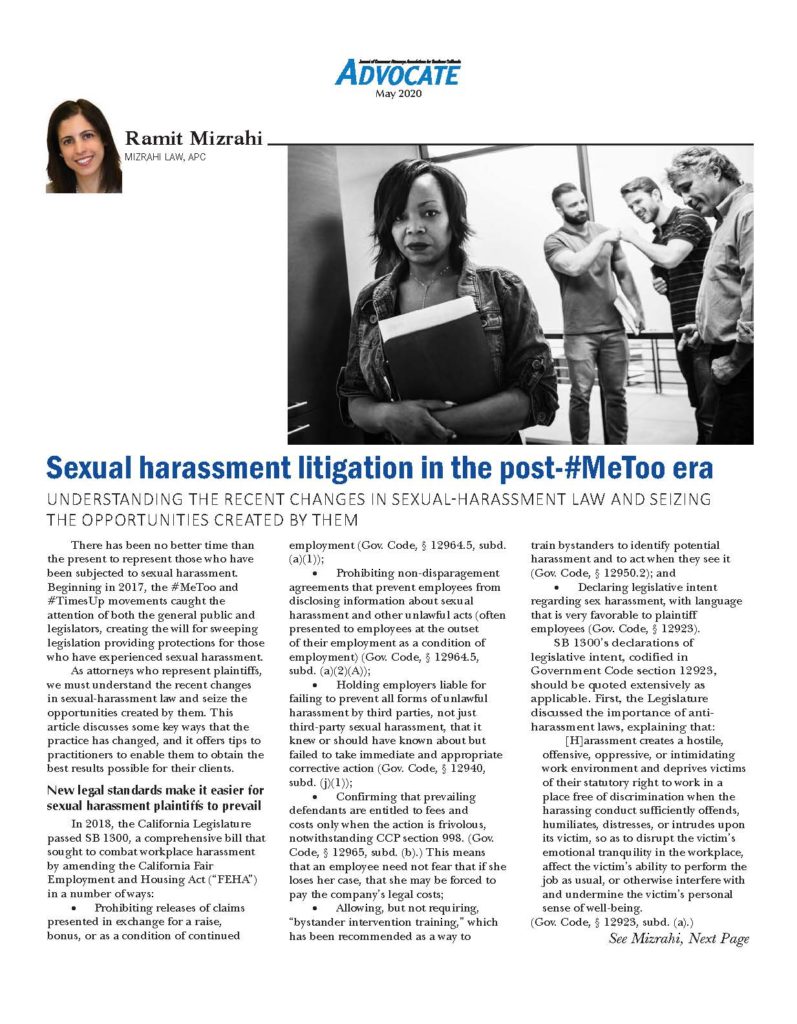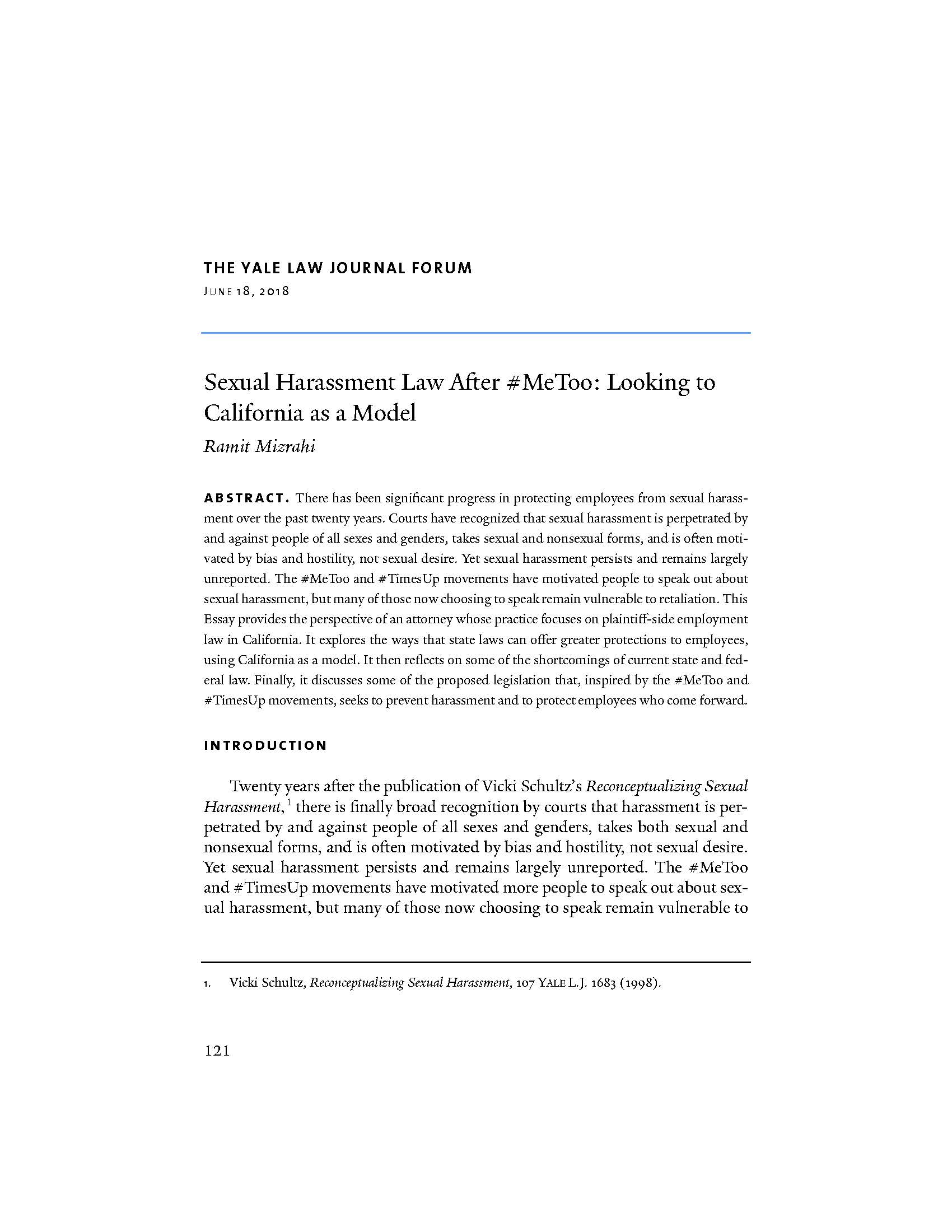-

On May 11, 2022, Ramit Mizrahi appeared on KALW’s Your Legal Rights radio show to discuss workplace harassment–and retaliation–as people return to the workplace, along with with Michael Robbins, Jeffrey Hayden, and Dean E. Johnson. You can listen to the program here.
The following resources may also be helpful:
- A blog post delving into sexual harassment;
- An article by Ramit Mizrahi on sexual harassment litigation in the post-#MeToo era;
- A blog post on H.R.4445, the Ending Forced Arbitration of Sexual Assault and Sexual Harassment Act of 2021;
- A blog post on new California employment laws in 2021; and
- A blog post on new California employment laws in 2020.
-
16 Mar '22

On March 3, 2022, President Biden signed into law H.R.4445, the Ending Forced Arbitration of Sexual Assault and Sexual Harassment Act of 2021 (“Act”). The Act provides, in relevant part, that:
“Notwithstanding any other provision of this title, at the election of the person alleging conduct constituting a sexual harassment dispute or sexual assault dispute, or the named representative of a class or in a collective action alleging such conduct, no predispute arbitration agreement or predispute joint-action waiver shall be valid or enforceable with respect to a case which is filed under Federal, Tribal, or State law and relates to the sexual assault dispute or the sexual harassment dispute.”
What this means is that employers can no longer force employees who have been subjected to sexual harassment or sexual assault to submit their legal claims to arbitration. Employees can now choose to file their cases in court, regardless of the prior existence of an arbitration agreement. Nor can employers force employees to give up the right to file a class or collective action related to sexual harassment or sexual assault.
The Act explicitly provides that it applies to any dispute or claim that arises or accrues on or after the date of enactment, meaning any harassment or sexual assault occurring on or after March 3, 2022. It does not apply to existing cases already in arbitration or ones where the sexual harassment or assault only occurred before March 3, 2022.
The Act provides that any dispute regarding the applicability of the Act to an arbitration agreement must be decided by a court, not an arbitrator.
We anticipate that more employment lawsuits will include claims for sexual harassment, and that courts will invalidate arbitration agreements in those cases.
This law levels the playing field by giving people subjected to sexual harassment and sexual assault a fair shot at justice. Research has shown that consumers are more likely to be struck by lightning than to win a monetary award in arbitration. We hope it opens the door to further legislation prohibiting arbitration in all employment and consumer cases.
-

You say it’s a “hostile work environment.” But is that workplace bully breaking the law? The answer may surprise you.
So your boss/supervisor is a jerk. He’s mean, abusive, and he talks down to you. He embarrasses you in front of others and he diminishes your work. You think he may be sabotaging you and intentionally setting you up to fail. Surely he’s breaking the law and you have a case, right?
Not necessarily.
-
The May 2020 issue of Advocate Magazine features an article authored by Ramit Mizrahi.
The article — “Sexual harassment litigation in the post-#MeToo era” — discusses recent changes in sexual harassment law in California and the opportunities created by them. Click on the below image to read the article in full.
-

Over the past two years, we have followed the many bills that the California legislature has passed with the momentum of the #MeToo and #TimesUp movements. From last year’s omnibus sexual harassment bill (SB 1300), to the prohibition of confidentiality provisions in settlement agreements involving sexual harassment claims (SB 820), to the increase in time that employees would have to file claims under the Fair Employment and Housing Act (AB 9), these bills have been designed to increase protections for California workers.
Assembly Bill 749 (“AB 749”), introduced by Assemblymembers Mark Stone, Lorena Gonzalez, and Eloise Reyes, is another #MeToo-inspired bill meant to protect employees. It tackles “no rehire” provisions that are frequently found in settlement agreements. Employees who settle their claims against their employers are often required to agree that they will never again work for the same employer or its related entities. Such provisions are punitive and can have a devastating impact on an employee, forcing some to leave their field or severely limiting their future employment prospects. The use of “no rehire” provisions often leads to the perverse outcome where victimized employees are forced out of their jobs while harassers continue to be employed.[1]
AB 749, signed into law by Governor Newsom on October 12, 2019, prohibits and invalidates all provisions in settlement agreements that prevent workers from obtaining future employment with the settling employer or its affiliated companies. Through newly created Code of Civil Procedure section 1002.5, it makes such provisions in agreements entered into on or after January 1, 2020 void as a matter of law and against public policy. The bill is co-sponsored by the California Employment Lawyers Association and Equal Rights Advocates.
-
03 Oct '18
Acting on the momentum of the #MeToo and #TimesUp movements, California legislators have leapt into action, putting forward legislation to protect employees who have been subjected to or opposed sexual harassment. They sought to limit confidentiality and nondisparagement provisions, restrict mandatory arbitration, increase recordkeeping and training obligations, extend the statute of limitations, and create individual liability for retaliation. In June, I wrote about the importance and potential impact of these bills in Sexual Harassment Law After #MeToo: Looking to California as a Model, published in the Yale Law Journal Forum.
On September 30, 2018, Governor Brown signed into law a number of the bills aimed at addressing sexual harassment and abuse. He vetoed several others, to the disappointment of employee rights advocates. Overall, however, the new laws are cause for celebration.
Bills Signed into Law
SB 820, The Stand Together Against Non-Disclosures (STAND) Act
SB 820 prohibits confidentiality provisions in the settlement agreement of any civil or administrative action that states a cause of action for: sexual assault; workplace harassment or discrimination based on sex; failure to prevent workplace harassment or discrimination based on sex; sexual harassment in a business, service, or professional relationship; and sex discrimination, harassment, or retaliation by the owner of a housing accommodation. The law permits restrictions on disclosure of the settlement amount. An employee is entitled to request confidentiality. The STAND Act will make it more difficult for employers to support and protect serial harassers.
AB 3109
AB 3109 makes a provision in a contract or settlement agreement void and unenforceable if it waives a party’s right to testify in an administrative, legislative, or judicial proceeding concerning alleged criminal conduct or sexual harassment.
SB 1300
SB 1300 is a comprehensive bill that helps combat sexual harassment in a number of ways. Among other things, it:
- Prohibits nondisparagement agreements that gag employees from disclosing information about sexual harassment and other unlawful acts (often presented to employees at the outset of their employment as a condition of employment);
- Prohibits releases of claims presented in exchange for a raise, bonus, or as a condition of continued employment;
- Holds employers liable for failing to prevent all forms of unlawful harassment by third parties, not just sexual harassment;
- Confirms that prevailing defendants are entitled to fees and costs only when the action is frivolous, notwithstanding CCP section 998. This means that an employee need not fear that if she loses her case, that she may be forced to pay the company’s legal costs;
- Declares legislative intent regarding sex harassment, including that a single incident can constitute sex harassment, even absent extreme circumstances, that an employee’s work performance need not have suffered, and that summary judgment should rarely be granted;
- Makes sexual harassment training more robust.
AB 1619
AB 1619 increases the statute of limitations for civil action for sexual assault of an adult to
-
Less than a month before the movie “The Predator” was released, actress Olivia Munn learned that fellow actor Steven Wilder Striegel was a registered sex offender. She reported the information to the studio, and in response the studio pulled the scenes involving the actor. But, it turns out that The Predator’s director Shane Black was friends with Striegel and knew of his status as a registered sex offender before casting him in the movie. He never told Munn or anyone else involved in the production. And while the scene was cut, Munn has felt ostracism from her peers since she made her report.
This situation raises interesting questions about employers’ obligations to protect other employees and prevent sexual harassment. Below, I discuss some of the key laws that apply.
The Fair Employment and Housing Act Creates a Duty to Prevent Workplace Harassment
The California Fair Employment and Housing Act (FEHA), Government Code § 12940, prohibits workplace sexual harassment and other forms of harassment and discrimination based on protected categories. An employer is strictly liable for sexual harassment by a supervisor. It is also liable for harassment by coworkers, subordinates, and even nonemployees if it knew or should have known of the harassment and failed to take immediate and appropriate corrective action. An employer is also separately liable for failing to take all reasonable steps necessary to prevent discrimination and harassment from occurring.
This means that an employer faces significant exposure under the FEHA if it knowingly employs a sexual harasser or sex offender and fails to take actions to protect its other employees from sexual harassment by that person.
Megan’s Law Establishes a Sex Offender Registry, But Limits the Use of Such Information in Employment To Protecting Persons at Risk
California’s Megan’s Law, Penal Code § 290.46, requires the California Department of Justice to maintain a website that identifies individuals convicted of specific sex offenses. The Megan’s Law Website includes the following information about the sex offenders listed in the registry: their name and known aliases, a photograph, a physical description, including gender and race, date of birth, criminal history, prior adjudication as a sexually violent predator, the address at which the person resides, and any other information that the Department of Justice deems relevant. Crimes that trigger a listing in the registry include: rape, sexual battery, sexual trafficking of minors, and sex crimes involving children. Certain sex offenders may apply to have their information removed from the website…
-
On June 18, 2018, Ramit Mizrahi’s essay, Sexual Harassment Law After #MeToo: Looking to California as a Model, was published in the Yale Law Journal Forum. The essay is part of a Collection by the Yale Law Journal and the Stanford Law Journal on #MeToo and the Future of Sexual Harassment Law. Ms. Mizrahi’s essay is the only one in the Collection that gives the perspective of a practicing lawyer and is not written by a legal scholar.
Drawing from her extensive experience representing employees in sexual harassment cases, Ms. Mizrahi discusses the evolution of the law, including the impact of the #MeToo and #TimesUp movements, current shortcomings, and proposed legislation in California that would help prevent harassment and protect employees who come forward. This is Ms. Mizrahi’s second piece on sexual harassment law that the Yale Law Journal has published. The first was “Hostility to the Presence of Women”: Why Women Undermine Each Other in the Workplace and the Consequences for Title VII, Note, 113 Yale L.J. 1579 (2004).
The essay
Sexual Harassment Law After #MeToo: Looking to California as a Model can be found here. You can also click on the below image for the link to the pdf version: -
21 Jun '17

What is sexual harassment? A lawyer’s response.
Sexual harassment is rampant in many workplaces. Sometimes it can take extreme forms (for example, sexual assault), but other times it can be created through offensive and inappropriate comments that a supervisor or coworker considers to be “just joking.” Unwanted sexual conduct and comments can turn an otherwise perfect job into a nightmare.
There are two categories of sexual harassment:
- Quid pro quo sexual harassment, and
- Hostile work environment.
Quid Pro Quo Sexual Harassment
Quid pro quo sexual harassment occurs when a supervisor or person with authority conditions an employee’s job or job benefits on the acceptance of sexual advances or conduct, or when the supervisor makes employment decisions based on whether the employee accepted the sexual advances/conduct. A supervisor can engage in quid pro quo sexual harassment in a number of ways, including with sexual propositions, graphic discussions of sexual acts, and sexual comments on the employee’s body.
It does not need to be explicit. For example, if a supervisor insinuates that an employee will have to sleep with him to advance in the company, that is quid pro quo sexual harassment. Having to submit to sexual advances–or even having to laugh along to someone’s inappropriate sexual jokes–should never be a factor in whether someone succeeds at work. . . .
-
06 Jan '15

People are almost always surprised to learn that, despite the serious harms that they can cause, workplace bullying and hostile work environments are not illegal unless motivated by discriminatory or retaliatory bias that the law specifically prohibits. The short version: being a jerk to everyone is, well, perfectly legal.Workplace bullying can be devastating. Those who are bullied feel humiliated and demoralized. The bullying can literally make them sick, causing stress and anxiety, depression, sleep disorders, and other illnesses. Employers also suffer as absenteeism increases, morale and productivity decline, and companies lose good employees.
Workplace bullying is also far too prevalent. A national survey conducted by Zogby found that 27% of people have suffered abusive conduct at work and another 21% have witnessed it happen. 7% of those surveyed said they were currently being bullied at work. The consequences of bullying were severe: 48% of those who were bullied said that they left their jobs or felt forced to quit because of the bullying, while 13% were terminated (probably in retaliation for speaking up), and another 13% were transferred to a different position.
Harassment
Mizrahi Law, APC
- 35 N Lake Ave, Ste 710, Pasadena, California 91101
- dates@mizrahilaw.com
- (626) 380-9000
Client Testimonial
“I highly recommend Ramit Mizrahi. She has a winning combination of knowledge, passion, strategy, and empathy. She takes action and communicates updates promptly. Her professionalism is hard to beat. I’d give her 10 stars if I could!”
Latest News
- Ramit Mizrahi has been recognized as one of the Top 100 Super Lawyers and Top 50 Women Super Lawyers in Southern California in 2023.
- Ms. Mizrahi is being recognized in the 2023 Edition of The Best Lawyers in America©, published by U.S. News & World Report and by Best Lawyers.
- Ms. Mizrahi has been selected as a Top Attorney by Pasadena Magazine for 2023.
- Ms. Mizrahi is serving as Chair of the Pasadena Bar Association Labor and Employment Section.




